A groundbreaking study emerging from the Chinese Academy of Sciences has unveiled compelling evidence highlighting the immense potential of the traditional herb Picria fel-terrae (PFL) in revolutionizing fish health management within aquaculture systems. This research, which intricately explores the biochemical and immunological pathways modulated by PFL, demonstrates that the dietary inclusion of this herb at a modest concentration of 0.1% in fish feed for six consecutive weeks can profoundly promote gut integrity, mitigate inflammation, and enhance overall fish resilience. These findings herald a transformative approach to sustaining aquaculture productivity without the conventional reliance on antibiotics.
The study meticulously documents the preservation of gut microarchitecture in PFL-treated fish, distinguishing them notably from untreated counterparts. Whereas untreated fish progressively showed signs of villous atrophy and compromised epithelial layers, PFL-supplemented fish maintained robust villi morphology crucial for nutrient absorption and barrier defense. The maintenance of intestinal epithelial integrity is vital, as it prevents the translocation of pathogens and endotoxins, thereby limiting systemic inflammatory responses that often plague farmed aquatic species.
Delving deeper into the herb’s immunomodulatory effects, the research reveals significant upregulation of mucus-secreting goblet cells within the gut mucosa of treated fish. This increase by approximately 30% in mucus-producing cells enhances the mucosal barrier, creating a frontline defense against enteric pathogens. Simultaneously, PFL application orchestrated a reduction in pro-inflammatory mediators, contributing to a balanced immune milieu that curtails chronic intestinal inflammation. This dual action fortifies the gut’s innate immune function essential for fish health in pathogen-rich aquaculture environments.
The immune benefits articulated extend beyond local gut responses. The research delineates how PFL modulates systemic immunity by elevating beneficial immune cell populations, including T helper (Th) cells, which are pivotal in orchestrating adaptive immune responses. Fish receiving PFL supplementation were also subjected to pathogenic challenges, demonstrating markedly improved survival rates compared to controls, signifying enhanced disease resistance mediated by the herb’s immunoregulatory properties.
At the molecular level, transcriptomic analyses divulged that PFL impacts multiple genetic pathways spanning innate immunity, metabolism, and cellular repair. Genes associated with anti-inflammatory cytokine production, xenobiotic metabolism, and epithelial restitution exhibited favorable expression patterns, underscoring PFL’s multipronged role in promoting homeostasis. This genomic insight suggests PFL acts not merely as an immunostimulant but as a holistic modulator of physiological functions integral to aquaculture animal welfare.
An additional and vital discovery concerned the herb’s influence on the gut microbiome, a critical determinant of host health. PFL treatment effectively reinstated gut bacterial populations commonly disrupted by plant-based diets, which are frequently used in fish feed formulations. By restoring microbial community balance, PFL likely supports improved nutrient utilization and immune function, addressing a significant challenge in sustainable fish feed development.
The integration of advanced methodological approaches empowers the robustness of the findings. From high-resolution 3D imaging to comprehensive microbiome sequencing and functional gene expression profiling, the investigative team endeavored to elucidate the nuanced mechanistic underpinnings of PFL’s action. Such rigorous experimental study design and multidisciplinary tactics provide a comprehensive framework that transcends merely observational insights.
This research situates itself amid the urgent global imperative to diminish antibiotic dependency in aquaculture, a sector confronting rising antimicrobial resistance and environmental pressures. By leveraging a naturally derived herbal compound, farmers could adopt strategies that maintain fish health while adhering to sustainable and regulatory-compliant practices. The herb’s efficacy at low dietary inclusion rates further supports its economic viability and scalability for commercial application.
Prof. Xiao-Qin Xia, the leading investigator, emphasizes the transformative potential of PFL in aquaculture health management. “Our comprehensive study reveals that this ancient botanical can simultaneously stabilize intestinal morphology, recalibrate immune responses, and potentiate metabolic pathways to enhance fish resilience,” Prof. Xia states. “Such multifaceted benefits are unprecedented and bear significant implications for sustainable aquaculture.”
The study also discusses hepatic metaflammation, a state of chronic, low-grade inflammation in the liver exacerbated by metabolic disturbances and immune dysregulation. PFL’s role in ameliorating hepatic metaflammation points towards systemic benefits extending beyond the gut, possibly mitigating liver dysfunctions commonly associated with intensive aquaculture practices. These insights open new avenues for integrated gut-liver axis therapeutic strategies employing botanicals.
Published in the journal Water Biology and Security, this work is a landmark addition to current scientific literature bridging traditional medicine and modern aquaculture science. The authors’ declaration of no competing interests underscores the integrity and academic rigor of the findings. As aquaculture continually strives for innovative health management tools, this pioneering study charts a promising course toward integrating plant-based bioactive compounds into fish nutrition paradigms.
In conclusion, the Chinese Academy of Sciences team has validated the profound impacts of Picria fel-terrae inclusion on fish gut health, immune modulation, metabolic regulation, and microbiome restoration. These comprehensive effects collectively promote robust systemic health and improved disease resistance. This herb, once confined to traditional usage, now offers a scientifically substantiated solution to modern aquaculture challenges, epitomizing the convergence of natural products and cutting-edge scientific innovation.
Subject of Research: Animals
Article Title: The effects of Picria fel-terrae Lour. on ameliorating hepatic metaflammation while modulating mucosal immunity in fish
Web References: http://dx.doi.org/10.1016/j.watbs.2025.100452
Image Credits: Xiaoqin Xia, et al
Keywords: Aquaculture, Fisheries




